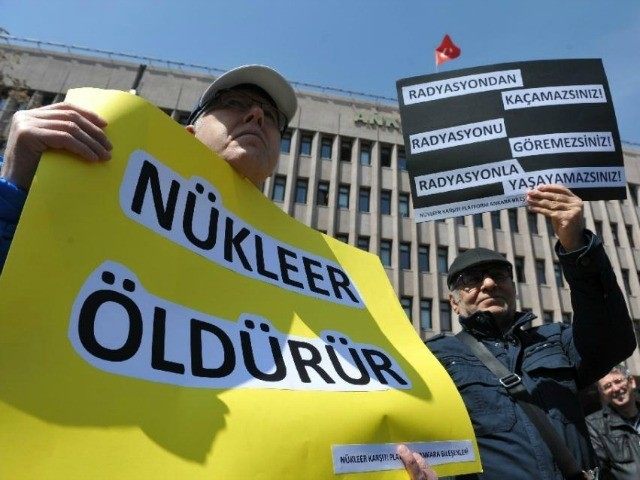Turkish authorities broke ground on Tuesday on the Akkuyu nuclear power plant, a project spearheaded by Russian developers that the Turkish government claims is indispensable to the nation’s energy independence. Akkuyu has been plagued by controversy following the nuclear deal that will allow Iran to continue similar development and prompting environmental experts to question the safety of a new plant on Mediterranean shores.
“If we had built this power station 10 years ago, we would have saved $14 billion in natural gas purchases,” said Turkish Energy Minister Taner Yıldız at the groundbreaking. He explained that authorities hope it will provide 28% of Turkey’s electricity when completed, and that the government was sufficiently convinced the plant would pose no environmental dangers.
The project, which Hurriyet reports will cost $22 billion, is being spearheaded by the Russian corporation Rosatom and is expected to function through 60 years. It is not expected to be completed before 2022. The blueprints follow the construction of what is expected to be the first nuclear power plant in Iran, also being constructed by Rosatom. The corporation has expanded its reach into the Middle East significantly in the past several months; in addition to the Turkish plant, Rosatom has signed deals with Jordan and Egypt for the construction of similar projects.
Environmentalists have been the most vocal opponents of the Akkuyu project so far. On Tuesday, authorities resorted to using water cannons to disperse a large crowd of environmentalists that had locked the attendants of the ground-breaking ceremony in the construction area and let people out. Protesters expressed concern that nuclear power is no longer safe, particularly given the ongoing disaster in Fukushima, Japan, following the 2011 earthquake and tsunami that affected its nuclear power plant.
Some experts believe environmental concerns are valid. Turkish ecology expert Pelin Cengiz told Zaman newspaper that officials had not done sufficient testing on this particular model of power plant, and that the prototype itself had not undergone any safety tests at all, which violates international norms on nuclear energy.
Others argue that the project is simply too expensive. In a column in Hurriyet, Yalçin Dogan notes that the actual output estimated for the Akkuyu plant is significantly inefficient. “In Western countries, a kilowatt-hour of electricity produced in nuclear power plants costs between 4 and 4.5 cents; however, in Akkuyu, it is 12.35 cents. It is the most expensive electricity in the world after Japan.” What’s more, the project is being partially handled by a Turkish corporation run by Mehmet Cengiz, a widely derided businessman after being caught saying on a hidden microphone, “We will f**k the nation.” Wryly, Dogan writes, “The power plant, with its nuclear damage to nature and to animal and human genes, will surely have an effect on the future generations.”
Supporters contend, as Yıldız did, that the expense is worth independence from an increasingly hostile international community, and that Turkey has shown clear signs of need on the energy issue. Just last month, a blackout hit Istanbul that was so long flights were diverted to prevent accidents while the issue was resolved.
The timing of Turkey’s new nuclear project is also notably close to the resolution of negotiations between Iran and a coalition of nations known as a P5+1, which resulted in a tentative deal reducing sanctions on Iran for its nuclear program and allowing the nation to continue enriching uranium. While Turkey has always vocally supported the Iranian nuclear program, President Recep Tayyip Erdogan expressed rare disagreement with Tehran regarding the nation’s expansion into Yemen. “Iran has begun annoying us,” Erdogan said of the nation’s support of Shiite Houthi rebels. Erdogan walked back his criticisms upon visiting Tehran, ostensibly to discuss bilateral trade.

COMMENTS
Please let us know if you're having issues with commenting.